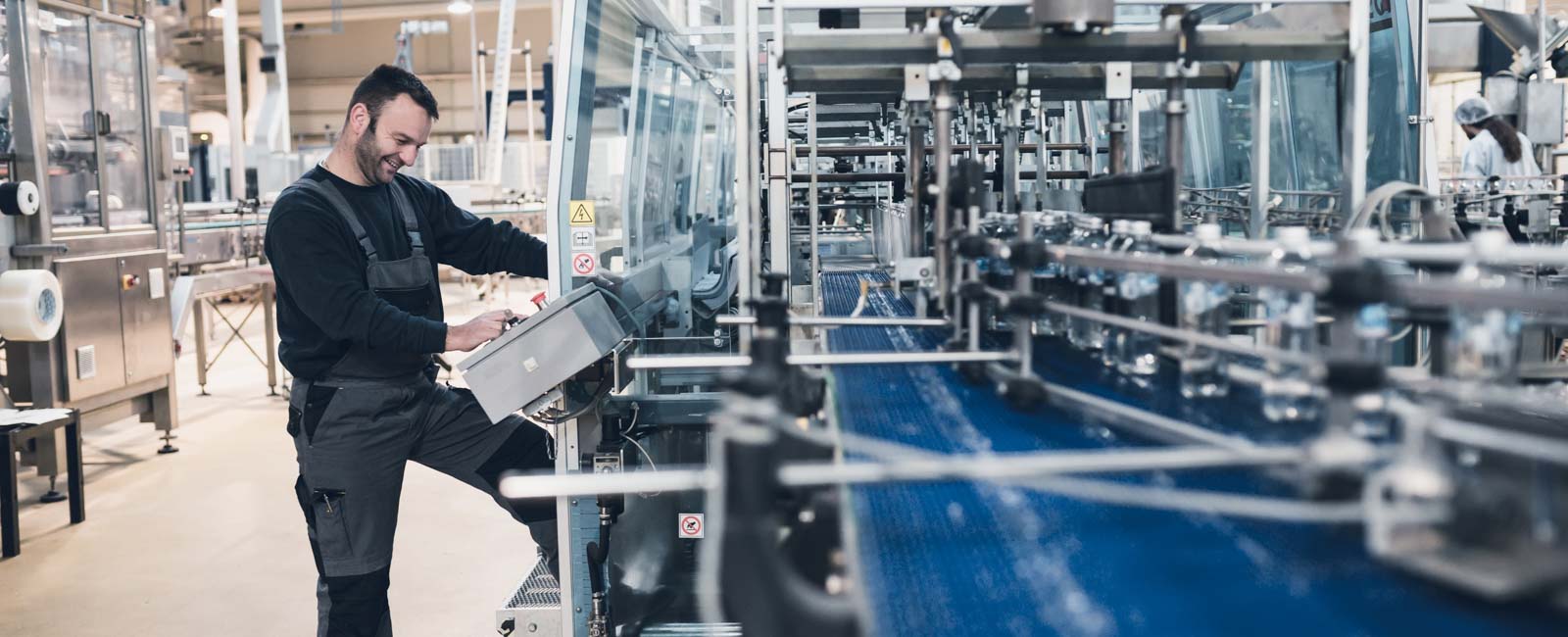

Get a Business Loan in Minnesota: Options for Small and Medium Businesses
Looking for a small business loan in Minnesota? Explore the types of loans available, learn how to qualify, and discover how Security Bank & Trust Co. can help local businesses succeed.
Grow Your Minnesota Business with the Right Loan.
The process of borrowing evolves as your business grows and prospers. At Security Bank & Trust Co., our undertaking is to empower entrepreneurs by helping them choose the right business loan to achieve their goals and drive sustainable growth.
Whether you're exploring self-funded search funds, entrepreneurship through acquisition, or traditional small business loans, we understand the unique needs of the market and the changing landscape of business financing. Preparing for a loan starts with understanding your options and aligning them with your business objectives.

"Before anything else, preparation is the key to success." Alexander Graham Bell
Preparation: The Key to a Successful Business Loan Application
Preparation is essential for all funding applications, whether you’re seeking investor capital or debt financing. Proper planning and organization can help you minimize equity dilution, reduce interest costs, and streamline the application process.
Our Business Loan Guide is designed to walk you through every step of the process so you know exactly what to expect. Here’s how we can help:
- Initial Loan Request
- Initial Delivery Items
- Analysis
- Business Loan Options

Crafting the Perfect Business Loan Request
5 Key Questions for Your Business Loan Request
Before approaching a financial institution, it’s essential to prepare your loan request by answering these five key questions:
- How much funding do you need?
- What will the funds be used for?
- How long do you need to repay the loan?
- How will the loan be repaid?
- What collateral will secure the loan?
Answering these questions ensures your loan request is clear and positions your business for success during underwriting and approval.
Example 1: Small Business Equipment Loan in Minnesota
A manufacturing business in Minnesota might structure their loan request as follows:
We are seeking a small business loan of $500,000 to purchase manufacturing equipment. This equipment will reduce expenses by $100,000 annually and improve production speeds. With a useful life of 10 years, we request a 7-year loan, repaid through cash flow and cost savings. As collateral, we will offer a purchase money security interest in the equipment and business assets.
Example 2: Real Estate Loan for Minnesota Businesses
A company purchasing property for expansion could write:
We need a real estate loan of $1,500,000 to buy a 24,000 SF office/industrial building in Anoka, MN. This transition from leasing to owning will reduce long-term costs. The building, built in 2001, is in good condition but requires $250,000 in improvements. We will repay the loan using cash flow and rental savings.
Why Preparation Matters
These examples provide a clear framework for presenting your loan request, helping our lenders tailor a customized proposal. Proper preparation saves time and ensures a smooth approval process.

Initial Delivery Items: How to Prepare for Your Business Loan Application
What to Prepare for Your Business Loan Application
To streamline your business loan process, it’s important to prepare key documents and details in advance. At Security Bank & Trust Co., we’ve outlined the essential items you’ll need to provide:
1. Brief History of the Company, Ownership, and Management
Your business’s story matters to us. Share:
- The history of your business and its achievements
- Key management team experience
- Ownership structure
Understanding your background helps us craft customized loan solutions.
2. Three Years of Business and Personal Tax Returns
Tax returns give us insight into your financial performance and stability. We evaluate:
- Net income, depreciation, interest, liquidity, and capital
- Any one-time events impacting your results (e.g., major sales or customer charge-offs)
Pro Tip: Highlight unusual or one-time events to give us a clearer picture of your cash flow.
3. Personal Financial Statements of Principals and Guarantors
Personal financial stability is often key to securing a business loan. A personal guaranty is typically required, and these statements help us:
- Assess the financial health of business owners
- Ensure a stable and cash flow-positive profile
4. Current Income Statement and Balance Sheet
Tax returns may not reflect your current performance, so we also request up-to-date financials, including:
- Revenue changes (e.g., new contracts or customer losses)
- Recent equipment acquisitions or depreciated assets
Complete, accurate information speeds up the decision-making process.
5. Sales, Accounts Receivable, and Accounts Payable Concentrations
We analyze:
- Sales concentrations over 10% of gross revenue
- Aging reports for accounts receivable and payable
- Concentrations or risks in your accounts
Providing these reports ensures a thorough underwriting process.
6. Purchase Agreements or Invoices
If you’re financing equipment or real estate, include purchase agreements or invoices. These documents help us:
- Verify the purchase and terms
- Understand associated costs (e.g., legal or commissions) that may not be financeable
Click Here for a Complete Commercial Loan Applicant Checklist
Why Preparation Matters
Organized information makes the loan application process faster and more efficient. By preparing these items in advance, you:
- Reduce delays in processing
- Enable more in-depth discussions with our lending experts
- Build a stronger financial partnership with Security Bank & Trust Co.

Understanding the Loan Underwriting Process
At Security Bank & Trust Co., the underwriting process is designed to not only evaluate your loan request but also to strengthen the partnership we build with your business. By this stage, we’ve already reviewed your information, discussed your plans, and gathered insights into your goals.
What is Loan Underwriting?
Loan underwriting is how we evaluate your business’s financial health and assess the risks of the loan. It involves verifying your documents for accuracy, analyzing key metrics, and ensuring the loan is structured to meet both your needs and our lending guidelines.
Our goal is to make the process smooth, transparent, and efficient, so you can focus on growing your business.
How Long Does the Process Take?
At Security Bank, we aim to streamline underwriting for small business owners. Here’s what you can expect:
- Initial Review: 3-5 business days to verify submitted documents.
- In-Depth Underwriting: 5-10 business days to analyze financials and assess risk.
- Proposal Stage: Typically within 2 weeks, depending on the complexity of your request.
Pro Tip: Providing organized and complete financial information upfront can help reduce delays.
What We Look for During Underwriting
During the underwriting process, we evaluate several factors to determine your business’s financial health and creditworthiness:
- Cash Flow: Your ability to repay the loan from business operations.
- Collateral: Assets to secure the loan, such as real estate, equipment, or receivables.
- Credit History: Personal and business credit scores.
- Management Experience: Your leadership team’s expertise.
- Industry Risks: Market trends that could impact your business.
Key Financial Metrics We Use
To ensure fairness and transparency, we evaluate the following financial metrics as part of the underwriting process:
- Debt Service Coverage Ratio (DSCR): EBITDA ÷ Debt Service Payments
- Indicates whether your business generates enough income to cover its debt obligations.
- Current Ratio: Current Assets ÷ Current Liabilities
- Measures liquidity and short-term financial stability.
- Quick Ratio: (Cash + Accounts Receivable + Marketable Securities) ÷ Current Liabilities
- Evaluates immediate liquidity, excluding inventory.
- UCA Cash Flow Coverage Ratio: Net Cash after Operations ÷ (Current Portion of Debt + Interest Expense)
- Assesses whether cash flow from operations can cover debt payments.
- Revenue Growth Trend: Tracks how your business is expanding over time.
- Debt to Tangible Net Worth Ratio: Measures financial leverage compared to industry peers.
These metrics may not define your success as a business, but they help us assess risk and tailor financing options to fit your needs.
Common Challenges and How to Overcome Them
We know that preparing for underwriting can feel overwhelming, so here are some common challenges and how to navigate them:
- Incomplete Documentation: Missing documents can slow the process. Use our Commercial Loan Application Checklist to stay organized and review our Comprehensive Guide.
- Unrealistic Loan Requests: Ensure your requested amount aligns with your cash flow and repayment ability.
- Unexplained Financial Fluctuations: Be upfront about one-time events, like major sales or unexpected losses, that impacted your financials.
Why Choose Security Bank for Your Loan?
As a community bank, we prioritize personalized relationships and local expertise:
- Tailored Advice: We take the time to understand your business’s unique needs and provide creative solutions.
- Local Expertise: We know the Minnesota market and the challenges local businesses face.
- Quick Turnaround: Our streamlined process ensures timely decisions.
Client Success Story: Casa de Corazón
"Casa began its relationship with Security Bank with the opening of its 4th location and first franchise in Edina-Centennial Lakes. Security was pivotal in launching this location and the franchise company. It has been a joy to work with each member of the local team on everything from financing to account setup."
— Natalie Standridge, Founder & CEO, Casa de Corazón
What Makes Us Different
Beyond underwriting, we see ourselves as your partner in success. Our experienced lenders don’t just review your financials—they offer valuable insights to help you grow your business. In fact, many of our clients have saved time and money by leveraging our trusted advice.

Business Loan Options for Minnesota Small Business Owners
At Security Bank & Trust Co., we specialize in helping Minnesota businesses secure the financing they need to succeed. Whether your business requires a straightforward real estate or equipment loan or a more creative, customized solution, our team works closely with you to find the best options.
We also collaborate with local programs, such as:
- Minnesota Department of Employment and Economic Development
- Twin Cities Metro Area and our 21 local branch cities and municipalities
- Initiative Foundations
- Learn More in our Ultimate Guide to Minnesota Business Loans
These resources, combined with our expertise in industries like construction, professional services, real estate investment, and nonprofit organizations, allow us to provide tailored and thoughtful loan proposals.
Here are some of the most popular business loan options we offer:
1. Business Line of Credit for Flexible Cash Flow Management
A business line of credit is a powerful tool for managing your company’s short-term financial needs. It’s perfect for:
- Purchasing inventory or raw materials
- Managing seasonal cash flow gaps
- Handling unexpected expenses
- Refinancing short-term debts
Key Features:
- Loan Structure: Interest-only payments with a variable interest rate
- Term: Typically up to 12 months, renewable upon review
- Collateral: Secured by inventory, accounts receivable, or equipment (often managed with a borrowing base certificate and reporting)
This option is ideal for Minnesota businesses needing flexibility to seize opportunities or navigate temporary cash flow challenges.
2. Business Term Loan for Long-Term Investments
A business term loan is a traditional option for financing major investments and strategic growth. Use it to:
- Purchase fixed assets such as equipment or vehicles
- Fund tenant improvements or capital upgrades
- Acquire another business or franchise
- Invest in technology or infrastructure
Key Features:
- Loan Structure: Lump sum disbursement with scheduled repayments over the loan term
- Interest Rates: Fixed or variable rates available
- Common Use: Business acquisition loans often take the form of term loans
With predictable payments and tailored terms, a business term loan is perfect for entrepreneurs planning significant, long-term investments.
3. Business Real Estate Loan for Property Acquisition or Expansion
If your business is purchasing, constructing, or refinancing real estate, a business real estate loan is the ideal solution. We support:
- Office and industrial building purchases
- Real estate refinancing to reduce interest costs
- Construction projects for expansion or development
Key Features:
- Loan Types: Construction loans, term loans, and lines of credit
- Rates: Fixed rates up to 10 years (with common terms of 3-5 years) or variable rates
- Loan-to-Value (LTV): Typically 75-80% of the property’s appraised value
- Amortization: 15-25 years depending on the loan structure
Minnesota businesses looking to own or expand their physical space can benefit from our competitive terms and personalized guidance.
4. Specialized Loans for Unique Business Needs
Every business is unique, and some financing solutions require creativity and customization. Security Bank & Trust Co. offers specialized loans, including:
- Equipment Financing: For purchasing or upgrading business-critical machinery
- Construction Loans: Tailored to Minnesota contractors and developers
- Municipal Financing: We are a leader in financing cities and municipalities in private placement loans in Minnesota.
Frequently Asked Questions (FAQs) About Business Loan Options
What’s the difference between a business line of credit and a term loan?
A business line of credit is a flexible, revolving loan that lets you borrow as needed and pay interest only on the amount used. A term loan, on the other hand, provides a lump sum upfront with scheduled repayments over a fixed period, ideal for long-term investments.
How do I qualify for a business loan at Security Bank?
Eligibility depends on factors like your business’s financial history, cash flow, credit score, and collateral. Our lending team works with you to ensure you meet the necessary requirements and provide tailored advice.
Can startups apply for a business loan?
Yes, startups can apply for loans, especially if they can provide collateral, a strong business plan, and demonstrate personal creditworthiness. Our team will help guide you through the process.
What collateral do I need for a business loan?
Collateral can include accounts receivable, inventory, equipment, real estate, or other business assets. The type and value of collateral depend on the loan type and amount.
How long does it take to get approved for a business loan?
Approval timelines vary based on the loan type and complexity. For standard loans, you can expect a decision within 2-3 weeks, depending on the completeness of your documentation.
Why Minnesota Businesses Choose Security Bank & Trust Co.
- Local Expertise: With deep roots in Minnesota, we understand the challenges and opportunities businesses face in our communities.
- Customized Solutions: We specialize in tailoring loan proposals to meet the specific needs of small and medium-sized businesses.
- Trusted Relationships: We partner with local municipalities and programs to offer additional resources for your success.

SBA Loan Options for Minnesota Small Businesses
A common misconception about Small Business Administration (SBA) loans is that the SBA lends money directly to entrepreneurs. Instead, the SBA partners with banks like Security Bank & Trust Co. to guarantee a portion of the loan. This guarantee reduces the risk for lenders, allowing us to offer more flexible terms to small business owners.
When you apply for an SBA loan, you're applying for a commercial loan through Security Bank, structured according to SBA guidelines and backed by an SBA guarantee. These loans are designed to support startups, growing businesses, and companies needing longer terms or lower down payments than traditional loans might allow.
Why Choose an SBA Loan?
SBA loans can provide significant advantages, including:
- Lower Down Payments: Compared to traditional loans, SBA loans often require less equity upfront.
- Longer Terms: Extended repayment terms can make monthly payments more manageable.
- Flexible Qualification Requirements: SBA loans are often available to businesses with limited credit history or higher perceived risk.
However, it’s important to consider:
- Closing Costs: SBA loans often come with additional fees for the guarantee.
- Collateral Requirements: The SBA typically requires sufficient collateral to secure the loan.
- Approval Timelines: SBA loans may take slightly longer to process due to additional paperwork and government involvement.
How SBA Loans Work at Security Bank & Trust Co.
At Security Bank & Trust Co., we simplify the SBA loan process by guiding you through each step, from determining eligibility to securing approval. Here’s how it works:
- Assess Your Needs: We’ll review your goals to determine whether an SBA 7(a) or 504 loan is the best fit.
- Prepare Your Application: We’ll help you gather the necessary financial documents and complete the SBA-required paperwork.
- Submit for Approval: Once your application is complete, we’ll submit it for SBA approval and work closely with the agency to expedite the process.
- Close and Fund Your Loan: After approval, we’ll finalize the terms and disburse funds to get your project moving.
Comparing SBA Loans vs. Traditional Loans
When considering an SBA loan, it’s essential to weigh the benefits against traditional financing options.
| Feature | SBA Loans | Traditional Loans |
|---|---|---|
| Down Payment | As low as 10% | Typically 20-30% |
| Loan Term | Up to 25 years, business, collateral, and cash flow dependent | Up to 25 years, business, collateral, and cash flow dependent |
| Interest Rates | Fixed or Variable | Fixed or variable |
| Collateral Requirements | SBA provides more flexibility on collateral coverage. | Varies by business and financial strength of borrower |
| Processing Time | Slightly longer due to SBA review | Faster |
Frequently Asked Questions (FAQs) About SBA Loans
How do I know if an SBA loan is right for my business?
An SBA loan is a great option if you need long-term financing, lower down payments, or flexible terms, especially for startups or businesses with limited credit history.
What are the most common uses for SBA loans?
SBA loans can be used for working capital, equipment purchases, real estate acquisition, refinancing debt, and business expansion.
How long does it take to get an SBA loan?
The process can take anywhere from 30-60 days, depending on the complexity of your request and the completeness of your application.
What credit score do I need for an SBA loan?
While specific requirements vary, a credit score of 640 or higher is generally preferred. Strong collateral and cash flow can sometimes compensate for lower credit scores.
Can I use an SBA loan for a startup?
Yes! SBA loans, particularly 7(a) loans, are designed to help startups and businesses with limited operating history.
Why Choose Security Bank for Your SBA Loan?
- Local Expertise: As a Minnesota-based community bank, we understand the unique challenges local businesses face.
- Guidance Through the Process: We’ll help you navigate the complexities of SBA loans to save time and avoid pitfalls. For further reading, check out our post on What SBA loans are available for your Minnesota business?
- Commitment to Your Success: Our goal is to provide financing that helps your business thrive for the long term.
SBA 504 Loan: Financing for Long-Term Growth
The SBA 504 Loan Program is designed to help small businesses expand by providing long-term, fixed-rate financing for major purchases. This program is ideal for entrepreneurs who are looking to:
- Acquire land or buildings for business use
- Purchase large machinery or equipment
- Fund construction or renovation projects
SBA 504 loans are administered by Certified Development Companies (CDCs) in partnership with banks like Security Bank & Trust Co. This partnership allows businesses to secure financing with competitive terms and lower down payments than traditional loan options.
Key Features of SBA 504 Loans
-
Low Down Payments:
- As little as 10% down, compared to 20-30% for traditional loans.
- Ideal for small business owners preserving cash for operations or other investments.
-
Fixed Interest Rates:
- Offers 10-, 20-, or even 25-year fixed rates for the SBA-backed portion of the loan, ensuring predictable payments over the loan term.
- Competitive rates protect against market fluctuations.
-
Two-Lender Structure:
- 50% of the loan is financed by Security Bank & Trust Co.
- 40% of the loan is backed by the SBA and financed through a CDC.
- 10% is contributed by the borrower as a down payment.
-
Loan Amounts:
- SBA 504 loans can fund projects of up to $5.5 million for the SBA-backed portion, with total project costs often exceeding this when combined with bank financing.
-
Eligible Uses:
- Purchasing commercial real estate, such as offices, warehouses, or retail spaces.
- Buying equipment or machinery critical to operations.
- Renovating or expanding existing facilities.
Benefits of SBA 504 Loans for Business Owners
- Affordability: Low down payments and fixed interest rates make SBA 504 loans accessible and budget-friendly.
- Long-Term Stability: With repayment terms of up to 25 years, businesses can spread costs over time while maintaining stable payments.
- Preservation of Capital: The reduced equity requirement allows you to retain more working capital for other growth initiatives.
Who is Eligible for an SBA 504 Loan?
To qualify for an SBA 504 loan, your business must:
- Operate as a for-profit business in the United States.
- Have a tangible net worth of $15 million or less.
- Demonstrate an average net income of $5 million or less after taxes for the past two years.
- Use the funds for approved purposes, such as real estate or equipment purchases.
Security Bank & Trust Co. will work with you to assess eligibility and guide you through the application process.
Example: How an SBA 504 Loan Works
Scenario:
A Minnesota manufacturing company wants to expand by purchasing a larger warehouse and upgrading its production equipment. The total project cost is $2.5 million, broken down as follows:
- $1.25 million (50%) financed by Security Bank & Trust Co.
- $1 million (40%) financed through the SBA and CDC.
- $250,000 (10%) contributed by the business owner as a down payment.
With this structure, the business secures the funding it needs while preserving cash flow and benefiting from long-term fixed rates.
SBA 7(a) Loan: Flexible Financing for Your Business Needs
The SBA 7(a) Loan Program is the most popular of all SBA loan options, offering flexible funding to help small businesses grow and thrive. Whether you need working capital, want to purchase equipment, or plan to expand your business, the SBA 7(a) loan can provide the financing you need with competitive terms and lower down payments compared to traditional loans.
Key Features of SBA 7(a) Loans
-
Wide Range of Uses:
SBA 7(a) loans are incredibly versatile and can be used for:- Purchasing equipment or inventory
- Expanding or acquiring a business
- Funding working capital needs
- Refinancing high-interest debt
- Buying real estate for business use
-
Flexible Loan Terms:
- Working Capital: Terms up to 7 years
- Equipment or Inventory Purchases: Terms up to 10 years
- Real Estate: Terms up to 25 years
-
Loan Amounts:
- Borrow up to $5 million, making the SBA 7(a) loan a great option for both small and medium-sized businesses.
-
Competitive Interest Rates:
- Offers both fixed and variable interest rate options, typically tied to the Prime Rate.
-
Lower Down Payments:
- Requires less upfront equity compared to traditional loans, preserving your cash flow for operational needs.
Benefits of SBA 7(a) Loans for Business Owners
- Affordability: Flexible terms and competitive rates make SBA 7(a) loans an excellent choice for growing businesses.
- Versatility: With funding available for nearly every business purpose, the SBA 7(a) loan adapts to your unique needs.
- Ease of Repayment: Extended terms keep monthly payments manageable, even for larger loan amounts.
Who is Eligible for an SBA 7(a) Loan?
SBA 7(a) loans are available to small businesses that meet the following criteria:
- Operate as a for-profit business in the United States.
- Meet the SBA’s definition of a small business, based on industry size standards.
- Demonstrate the ability to repay the loan from existing or projected cash flow.
- Have a reasonable owner equity contribution.
Security Bank & Trust Co. will guide you through the qualification process to ensure you meet all requirements.
Example: How an SBA 7(a) Loan Works
Scenario:
A small retail business in Minnesota wants to expand by opening a second location and purchasing additional inventory. The project costs total $800,000, broken down as follows:
- $500,000 for leasing and building out the new location
- $200,000 for inventory purchases
- $100,000 for marketing and working capital
The owner applies for an SBA 7(a) loan and receives:
- Loan Amount: $700,000 (the SBA-backed portion)
- Equity Contribution: $100,000 from the business owner
- Repayment Terms: 10 years for the build-out and inventory
This structure allows the owner to preserve cash flow while expanding operations.
Are you ready to take the next steps after exploring our comprehensive business loan guide? Talk with one Security's lenders today!
Ready to simplify your business loan journey? Schedule a meeting with Security Bank & Trust Co. today and let's start Growing, together.
Talk With a Lender
